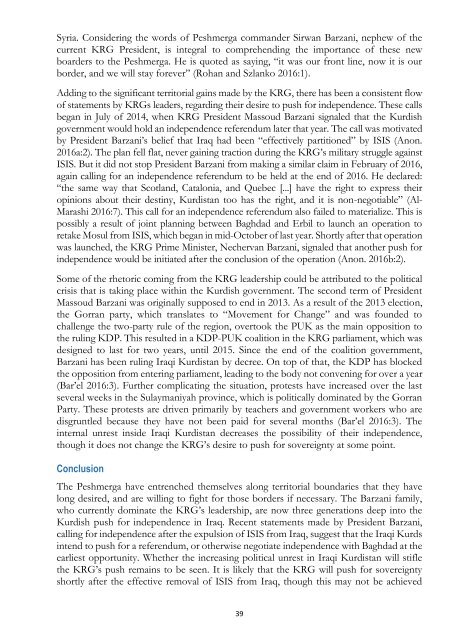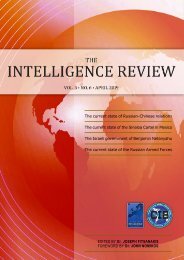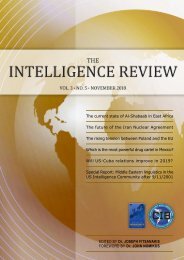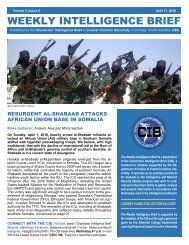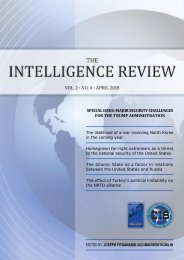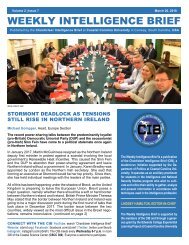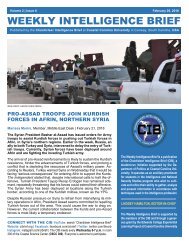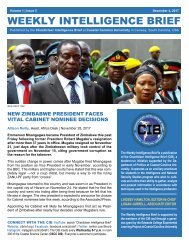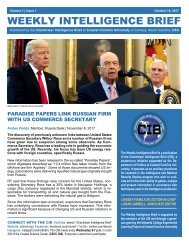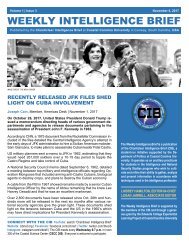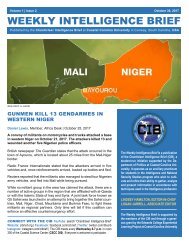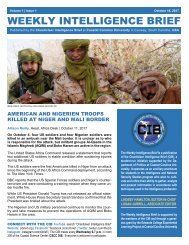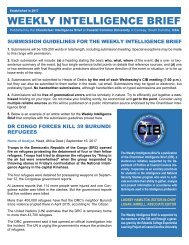The Intelligence Review | volume 1 | issue 2 |
This volume is the product of a collaboration between the European Intelligence Academy (EIA) and the Chanticleer Intelligence Brief (CIB), a student-run initiative supported by the Department of Politics at Coastal Carolina University in Conway, South Carolina, United States. Eleven CIB analysts tackle some of the most pressing and timely questions confronting intelligence observers today. Topics include the gun control debate in the United States, Russia’s involvement in the Syrian Civil War, the future of Kurdish nationalism, and the internal Palestinian dispute between Hamas and Fatah. Papers in this volume also examine the current state of Islamist extremism, and extrapolate on its future prospects in the Middle East, West Africa, the Lake Chad region, as well as in Southeast and Central Asia. CIB analysts propose carefully crafted and informed forecasts that outline future developments in some of the world's most unpredictable hot spots.
This volume is the product of a collaboration between the European Intelligence Academy (EIA) and the Chanticleer Intelligence Brief (CIB), a student-run initiative supported by the Department of Politics at Coastal Carolina University in Conway, South Carolina, United States. Eleven CIB analysts tackle some of the most pressing and timely questions confronting intelligence observers today. Topics include the gun control debate in the United States, Russia’s involvement in the Syrian Civil War, the future of Kurdish nationalism, and the internal Palestinian dispute between Hamas and Fatah. Papers in this volume also examine the current state of Islamist extremism, and extrapolate on its future prospects in the Middle East, West Africa, the Lake Chad region, as well as in Southeast and Central Asia. CIB analysts propose carefully crafted and informed forecasts that outline future developments in some of the world's most unpredictable hot spots.
- No tags were found...
You also want an ePaper? Increase the reach of your titles
YUMPU automatically turns print PDFs into web optimized ePapers that Google loves.
Syria. Considering the words of Peshmerga commander Sirwan Barzani, nephew of the<br />
current KRG President, is integral to comprehending the importance of these new<br />
boarders to the Peshmerga. He is quoted as saying, “it was our front line, now it is our<br />
border, and we will stay forever” (Rohan and Szlanko 2016:1).<br />
Adding to the significant territorial gains made by the KRG, there has been a consistent flow<br />
of statements by KRGs leaders, regarding their desire to push for independence. <strong>The</strong>se calls<br />
began in July of 2014, when KRG President Massoud Barzani signaled that the Kurdish<br />
government would hold an independence referendum later that year. <strong>The</strong> call was motivated<br />
by President Barzani’s belief that Iraq had been “effectively partitioned” by ISIS (Anon.<br />
2016a:2). <strong>The</strong> plan fell flat, never gaining traction during the KRG’s military struggle against<br />
ISIS. But it did not stop President Barzani from making a similar claim in February of 2016,<br />
again calling for an independence referendum to be held at the end of 2016. He declared:<br />
“the same way that Scotland, Catalonia, and Quebec [...] have the right to express their<br />
opinions about their destiny, Kurdistan too has the right, and it is non-negotiable” (Al-<br />
Marashi 2016:7). This call for an independence referendum also failed to materialize. This is<br />
possibly a result of joint planning between Baghdad and Erbil to launch an operation to<br />
retake Mosul from ISIS, which began in mid-October of last year. Shortly after that operation<br />
was launched, the KRG Prime Minister, Nechervan Barzani, signaled that another push for<br />
independence would be initiated after the conclusion of the operation (Anon. 2016b:2).<br />
Some of the rhetoric coming from the KRG leadership could be attributed to the political<br />
crisis that is taking place within the Kurdish government. <strong>The</strong> second term of President<br />
Massoud Barzani was originally supposed to end in 2013. As a result of the 2013 election,<br />
the Gorran party, which translates to “Movement for Change” and was founded to<br />
challenge the two-party rule of the region, overtook the PUK as the main opposition to<br />
the ruling KDP. This resulted in a KDP-PUK coalition in the KRG parliament, which was<br />
designed to last for two years, until 2015. Since the end of the coalition government,<br />
Barzani has been ruling Iraqi Kurdistan by decree. On top of that, the KDP has blocked<br />
the opposition from entering parliament, leading to the body not convening for over a year<br />
(Bar’el 2016:3). Further complicating the situation, protests have increased over the last<br />
several weeks in the Sulaymaniyah province, which is politically dominated by the Gorran<br />
Party. <strong>The</strong>se protests are driven primarily by teachers and government workers who are<br />
disgruntled because they have not been paid for several months (Bar’el 2016:3). <strong>The</strong><br />
internal unrest inside Iraqi Kurdistan decreases the possibility of their independence,<br />
though it does not change the KRG’s desire to push for sovereignty at some point.<br />
Conclusion<br />
<strong>The</strong> Peshmerga have entrenched themselves along territorial boundaries that they have<br />
long desired, and are willing to fight for those borders if necessary. <strong>The</strong> Barzani family,<br />
who currently dominate the KRG’s leadership, are now three generations deep into the<br />
Kurdish push for independence in Iraq. Recent statements made by President Barzani,<br />
calling for independence after the expulsion of ISIS from Iraq, suggest that the Iraqi Kurds<br />
intend to push for a referendum, or otherwise negotiate independence with Baghdad at the<br />
earliest opportunity. Whether the increasing political unrest in Iraqi Kurdistan will stifle<br />
the KRG’s push remains to be seen. It is likely that the KRG will push for sovereignty<br />
shortly after the effective removal of ISIS from Iraq, though this may not be achieved<br />
39


